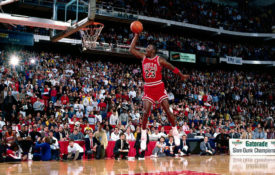The 2008 financial crisis fundamentally and irrevocably changed the global investment landscape by planting a seed that has revolutionized the way we approach value conception.
Pre-2008, we could not perceive of a more stable value conception than real estate. Then Wall Street proved us wrong. The world watched as a combination of creativity and greed collapsed our most tangible and credible asset market. The can of worms was well and truly open, and the question on everyone’s mind was, “How do we truly assess stable value?”
An unlikely answer materialized in the form of hobby enthusiasts and collectors—a group that has found unwavering value in beloved icons and possesses a compelling inclination to gamble for prestige. Add this to an investment market that is hungry for diversification, and now trading cards are fast becoming the world’s most premier, tangible asset.
How Trading Cards Have Helped Revive the Financial Market
Trading cards are a “passion equity,” aggressively consumed by a devoted investor base and arguably the greatest liquidity option of any competitive market—having outperformed both gold and real estate in the final months of 2021.
Kevin Lenane, newly appointed president of Professional Sports Authenticator (PSA) recently confirmed this in a conversation with CSQ CEO David Wurth. “The great value behind trading cards is that there is a tangible element, unlike NFTs or cryptocurrency,” Lenane says. “They are like a gold-backed currency, with the athlete providing the tangible value and the physical presence of the card reinforcing it. Cards may increase or decrease in value, but due to the passionate personal investment of collectors, they will always retain an inherent value.”
This is an investment factor that the investment community has enthusiastically embraced, culminating in the $6.6 million trade of a Honus Wagner card last year. Lenane chalks up the incredible success of his industry to a combination of in-depth market understanding and the fervent creativity of industry players.

The Honus Wagner T206 baseball card is now the most expensive sports trading card ever sold. Image source: The Athletic.
“As a person with decades of business experience, I can say with some authority that creativity is greatly underrated,” Lenane says. “It has blossomed in the collectibles industry, and there is still much potential for growth.”
Lenane’s Passion for Collecting Spearheaded Industry Growth
Lenane tells Wurth that he has always been a collector. “I collect both vintage and modern cards, and even vintage computers, which is a bit of a strange one,” he says. “I have been a hobbyist myself since I was 5 years old. However, my professional background is in machine vision and computer vision. So, when I saw the transformations in the grading industry for collectors’ cards it seemed quite natural to me that I put my expertise with technology behind optimizing this industry.”
PSA is the largest third-party trading card grading and authentication company in the world.
Lenane built his company, Genamint, based on the software he developed to digitally grade cards. Genamint was acquired by PSA in March 2021, and Lenane headed up PSA’s product division until October, when he was appointed its president.
The Passion of Industry Members Is Just as Important as That of Investors
Lenane says he is living his passion and believes that others who find a crossover of interests in the industry are a storehouse for untapped creative potential and opportunities for growth.
For example, Lenane describes the transformation of patch cards, which originally contained sections of player uniforms and now include autographs and gold inserts. “This increases the tangible value of the asset,” he says. Similarly, the industry has expanded to include new opportunities for vault companies. “Vaulting has really taken off, as investors look for ways to increase their value while decreasing the cost of shipping and taxes,” Lenane says. “As a result, you can now trade cards online with the guarantee of professional storage and safeguarding by vault companies that provide dedicated card trading services.”

Collectable is an up-and-coming fractional investing platform where hobbyists can share sports card ownership. Image source: CSQ.
Further innovation has seen a rise in “fractional trading cards,” where multiple individuals or even newly set up companies own a single, highly valued card. These companies are broken up into shares that are sold to different investors. This allows entry-level players to invest a small amount of money without their trade size being governed by the price of the investment. The shares can then be traded among investors in a system comparable to the stock market. “The value of modern trading cards increases and decreases in relation to the performance and career trajectory of specific players, thus creating a market not dissimilar to that of traditional investments,” says Lenane.
This was a spark of industry creativity that resulted in a new form of wealth generation. “They connected the dots between sports fervor, betting, and the untapped demand for a sports-oriented stock exchange,” Lenane says. “The market uptake was incredible.”
New Growth Opportunities in Trading Cards—and Other Passion Equities
It didn’t take long for the industry to realize that the opportunity for value creation extended far beyond sports enthusiasts. “The gaming industry has been a supernova for investors, as traders peddle everything from Pokémon cards to Super Mario Bros. PSA is expanding into Europe and Tokyo, and the growth potential is exciting, especially for same-day grading,” says Lenane, referring to the practice of grading authorities holding events that allow collectors to hand in their cards and receive an immediate valuation. “This increases the tangible value of collecting and adds to the excitement of being an investor. PSA is looking to increase our participation in such events.”
He adds that environmentalism is an important factor when an industry expands, and PSA considers itself to be on the forefront of what’s possible in sustainability within the collector industry. “We use the most up-to-date packaging material, and as soon as more environmentally friendly, recyclable materials are available, we will be the first to market.”
In the meantime, much of the growth is taking place in the digital sphere. Popular YouTubers have entered the industry, promoting collector’s items and livestreaming themselves playing with tradable cards. “There is a new generation of collectors entering the market and their proclivity for the online environment introduces a swath of new opportunities,” Lenana says. “With enough creativity, both new and existing industry players can capture this market in unexplored ways.”
Lenane describes the magnetism of the industry as a natural result of a cross section between hobbies and investment. “Who wouldn’t want to make money as an extension of their existing passion? That’s the magic of my job. I get to be a collector and a technological innovator,” says Lenane. “It’s the best of both worlds. It is also the magic behind this industry—we have tapped into the lifeblood of enthusiasts worldwide and made it possible for them to capitalize on their passion.”
C-Suite Quarterly / CSQ.com is the digital media company serving as the platform for authentic voice of business leaders around the world.














































